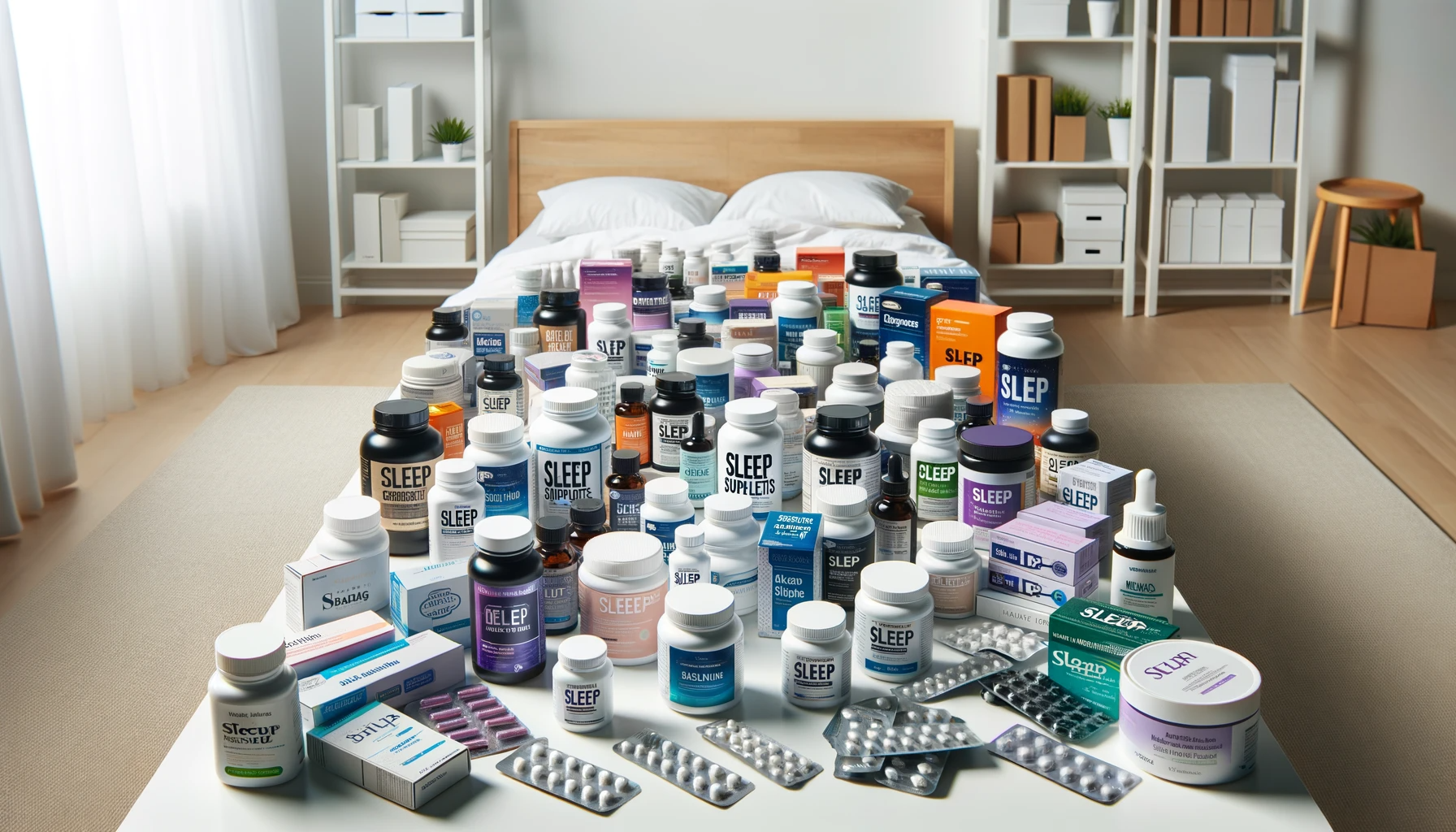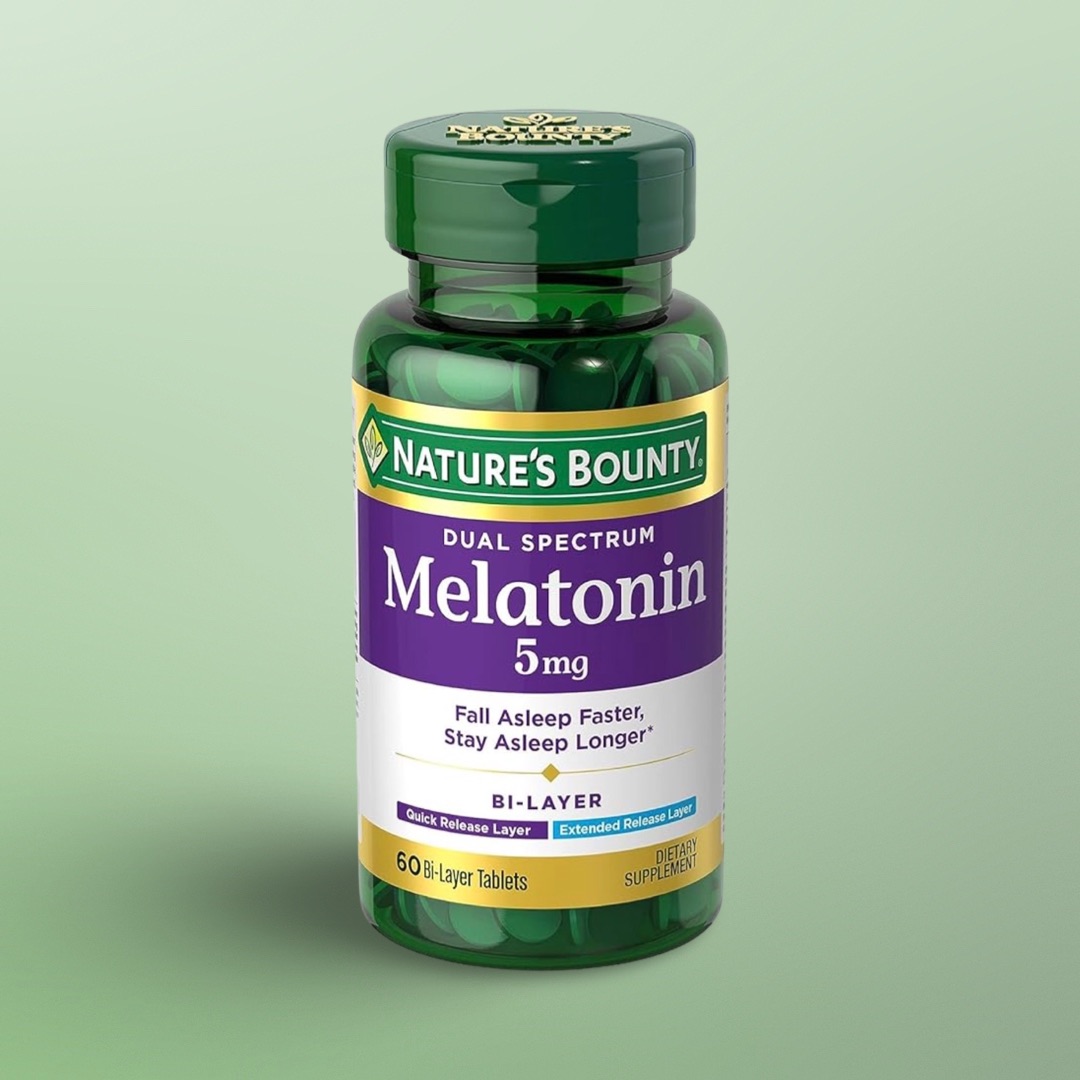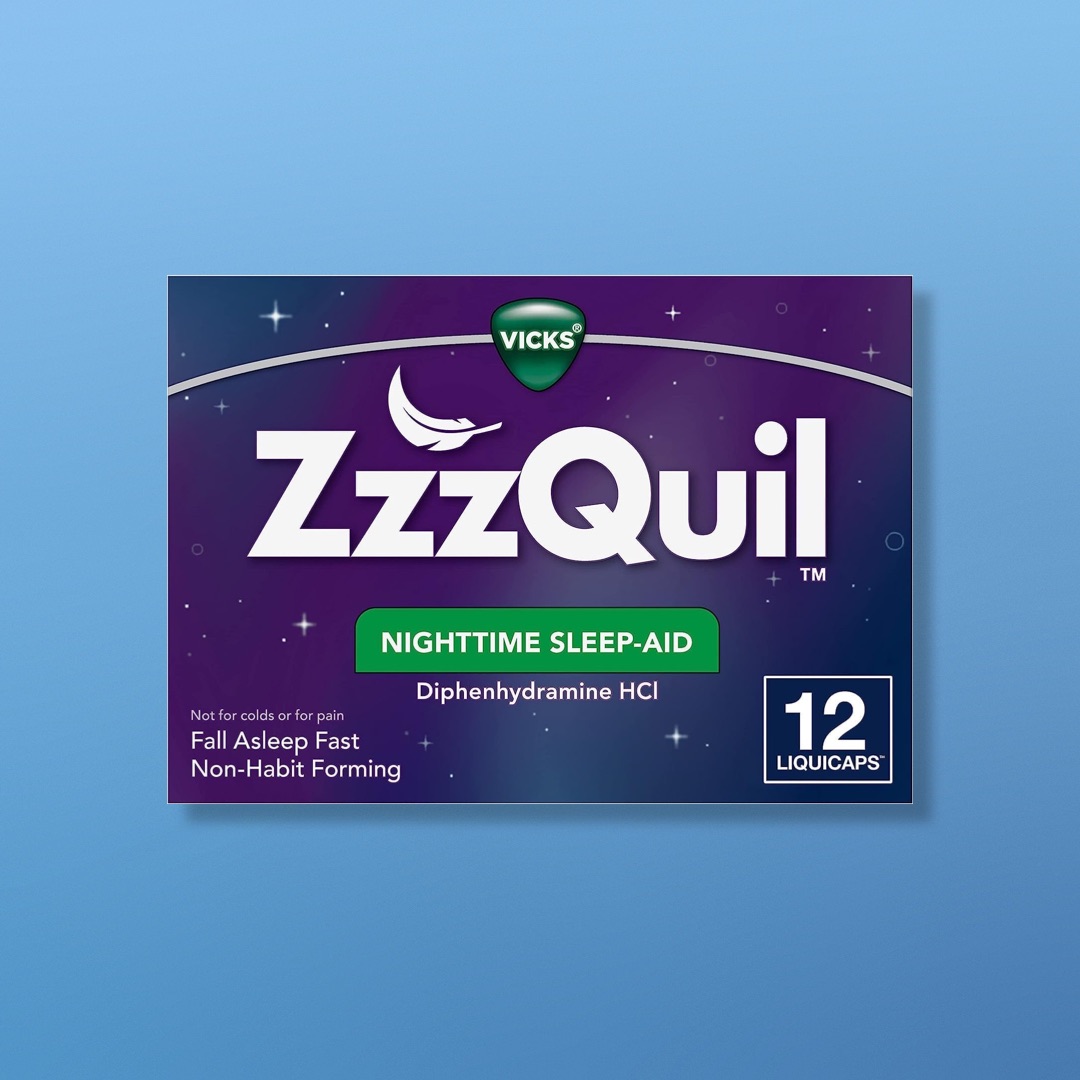which products to recommend. When you buy through our links, we may earn a commission. Learn more ›
The Best Sleep Aids, 2024
✨ How we made this sleep guide...
🧾 Clinical research
🩺 Subject experts
🪪 Certifications
⭐️ User Reviews
30 studies analyzed
8 sleep study experts
NSF, USP
4,679 reviews compared
🧾 Summary
We recommend

Photo: Harry Thompson
In the quest for great sleep, consumers face a dizzying selection of supplements and over-the-counter aids, each with bold and enticing promises of restfulness. But not all sleep remedies are created equal. This guide cuts through the marketing claims, using hard data from clinical research studies to determine the most safe and effective options available. We've put natural supplements and OTC sleep aids to the test, sifting through their claims and associated studies to recommend the specific products that actually deliver on their promises.
And the winners are...
Top Overall Pick

Nature's Bounty
Extended Release Melatonin (5mg)
Clinically-proven natural supplement with extended release
Rating: 5/5
Research indicates extended-release melatonin closely mimics the body's natural sleep processes, helping to maintain sleep without the abrupt waking that can occur with immediate-release versions. This type of supplement has the largest body of clinical studies supporting improvement of sleep quality, especially in individuals with delayed sleep phase syndrome and those experiencing sleep disturbances due to irregular schedules.
Best OTC Drug

ZzzQuil
Diphenhydramine HCl
Our choice for guaranteed sleep, with risk of next-day drowsiness
Rating: 4.5/5
Diphenhydramine HCl is widely recognized for its efficacy as a sleep aid and is particularly beneficial for those experiencing occasional sleeplessness. Its primary advantage lies in its ability to induce drowsiness quickly, aiding in faster sleep onset. This makes it a practical choice for individuals struggling to fall asleep due to temporary disturbances in their sleep schedule, such as jet lag or stress-related insomnia.
How we picked...
☑ Clinically-proven
We analyzed 30 reputable clinical placebo-controlled, double-blind clinical trials to identify the safest, most effective sleep remedies.
☑ Approved by sleep scientists
Our recommendations are guided by a variety of recognized sleep scientists, who bring years of practical experience treating real patients.
☑ Trusted by real consumers
We analyzed 4,679 verified user reviews to identify products that are consistently trusted by real customers for efficacy and safety.
Supplements vs. OTC drugs -- what's the difference?
In this guide, we’ve differentiated between dietary supplements and over-the-counter (OTC) drugs. Dietary supplements, including vitamins, minerals, and herbs, are less strictly regulated and aim to supplement the nutritional make-up of our diets. OTC drugs, which undergo more rigorous testing and regulatory approval by bodies like the FDA, contain active ingredients proven to treat or prevent diseases or disorders. Both supplements and OTC drugs have shown to be effective — to varying extents — at improving sleep quality.
Melatonin: 81%* clinically effective, side effects rare and mild
*percentage of clinical studies resulting in statistically significant sleep improvement
Melatonin is a hormone naturally produced by the body, and is widely recognized for its effectiveness in regulating sleep cycles and aiding sleep quality, without forming dependency.
Taken orally, melatonin helps to adjust your circadian rhythm and get you to sleep faster, while also lowering your core body temperature to promote better sleep throughout the night. It's particularly effective in improving sleep onset latency for anyone with insomnia or fitful nights of sleep.

Nature's Bounty
Extended Release Melatonin (5mg)
Clinically proven natural sleep supplement with extended release
Overall Rating: 5/5
🏆 Why we like it
Research indicates extended-release melatonin closely mimics the body's natural sleep processes, helping to maintain sleep without the abrupt waking that can occur with immediate-release versions. This type of supplement has the largest body of clinical studies supporting improvement of sleep quality, especially in individuals with delayed sleep phase syndrome and those experiencing sleep disturbances due to irregular schedules.
The science supports Melatonin as a sleep aid
Melatonin
Updated Jan 12, 2024. We analyzed 20 reputable placebo-controlled, double-blind clinical trials
to determine the efficacy, safety and legitimacy of melatonin as a sleep aid. Learn more >
Our take
Our analysis of the clinical studies conducted on melatonin suggest that it's an effective sleep aid for improving sleep quality, increasing sleep efficiency, and counteracting jet-lag effects, with minimal side effects and strong biological safety.
Clinical research
- Ferracioli-Oda E, Qawasmi A, Bloch MH Meta-analysis: melatonin for the treatment of primary sleep disorders PLoS One. (2013 May 17)
- Remy Luthringer, Muriel Muzet, Nava Zisapel, Luc Staner, The effect of prolonged-release melatonin on sleep measures and psychomotor performance in elderly patients with insomnia (2009-Sep-24)
- Carter MD, Juurlink DN Melatonin. CMAJ. (2012-Nov-20)
- Chen KH, Zeng BY, Zeng BS, Sun CK, Cheng YS, Su KP, Wu YC, Chen TY, Lin PY, Liang CS, Hsu CW, Chu CS, Chen YW, Yeh PY, Wu MK, Tseng PT, Hsu CY The efficacy of exogenous melatonin supplement in ameliorating irritable bowel syndrome severity: A meta-analysis of randomized controlled trials. J Formos Med Assoc. (2022-Oct-15)
- Wang L, Pan Y, Ye C, Guo L, Luo S, Dai S, Chen N, Wang E. A network meta-analysis of the long- and short-term efficacy of sleep medicines in adults and older adults. Neurosci Biobehav Rev. (2021-Dec)
- Kunz D, Mahlberg R, Müller C, Tilmann A, Bes F. Melatonin in patients with reduced REM sleep duration: two randomized controlled trials.J Clin Endocrinol Metab.(2004-Jan)
- Farahmand S, Vafaeian M, Vahidi E, Abdollahi A, Bagheri-Hariri S, Dehpour AR Comparison of exogenous melatonin versus placebo on sleep efficiency in emergency medicine residents working night shifts: A randomized trial.World J Emerg Med.(2018)
- Matsumoto M, Sack RL, Blood ML, Lewy AJ The amplitude of endogenous melatonin production is not affected by melatonin treatment in humans J Pineal Res.(1997 Jan)
- Arendt J, Bojkowski C, Folkard S, Franey C, Marks V, Minors D, Waterhouse J, Wever RA, Wildgruber C, Wright JSome effects of melatonin and the control of its secretion in humansCiba Found Symp.(1985)
- Patrick Lemoine, Doron Garfinkel, Moshe Laudon, Tali Nir, Nava Zisapel Prolonged-release melatonin for insomnia - an open-label long-term study of efficacy, safety, and withdrawal Ther Clin Risk Manag. (2011)
- Posadzki PP, Bajpai R, Kyaw BM, Roberts NJ, Brzezinski A, Christopoulos GI, Divakar U, Bajpai S, Soljak M, Dunleavy G, Jarbrink K, Nang EEK, Soh CK, Car J Melatonin and health: an umbrella review of health outcomes and biological mechanisms of action BMC Med.(2018 Feb 5)
- Erland LA, Saxena PK Melatonin Natural Health Products and Supplements: Presence of Serotonin and Significant Variability of Melatonin Content J Clin Sleep Med.(2017 Feb 15)
- Herxheimer A, Petrie KJ Melatonin for the prevention and treatment of jet lag Cochrane Database Syst Rev. (2002)
- Jin Hwa Kim, Young Sang Lyu, Sang Yong KimImpact of Social Jetlag on Weight Change in Adults: Korean National Health and Nutrition Examination Survey 2016-2017Int J Environ Res Public Health.(2020 Jun 18)
- Valtonen M, Niskanen L, Kangas AP, Koskinen TEffect of melatonin-rich night-time milk on sleep and activity in elderly institutionalized subjects.Nord J Psychiatry.(2005)
- Saleska JL, Bryant C, Kolobaric A, D'Adamo CR, Colwell CS, Loewy D, Chen J, Pauli EKThe Safety and Comparative Effectiveness of Non-Psychoactive Cannabinoid Formulations for the Improvement of Sleep: A Double-Blinded, Randomized Controlled Trial.J Am Nutr Assoc.(2023-May-10)
- Li C, Zhou X Melatonin and male reproduction. Clin Chim Acta.(2015-Jun-15)
- Mero AA, Vähälummukka M, Hulmi JJ, Kallio P, von Wright AEffects of resistance exercise session after oral ingestion of melatonin on physiological and performance responses of adult men.Eur J Appl Physiol.(2006-Apr)
- Luboshitzky R, Levi M, Shen-Orr Z, Blumenfeld Z, Herer P, Lavie PLong-term melatonin administration does not alter pituitary-gonadal hormone secretion in normal men.Hum Reprod.(2000-Jan)
- R Luboshitzky, Z Shen-Orr, T Shochat, P Herer, P Lavie Melatonin administered in the afternoon decreases next-day luteinizing hormone levels in men: lack of antagonism by flumazenil J Mol Neurosci.(1999 Feb)
A comprehensive 2013 analysis in PLOS One, synthesizing data from 19 studies with 1,683 participants, revealed that melatonin supplements notably reduced the time to fall asleep by seven minutes and extended sleep duration by eight minutes. While these improvements might seem modest, they varied significantly among individuals. Importantly, researchers also observed that melatonin enhanced overall sleep quality, including the aspect of waking up feeling refreshed.
Studies show that a minimum effective doses of melatonin can start as low as 0.3 mg, taken an hour before bed time. While doses in studies have reached up to 10 mg/day, higher doses are not necessarily more effective. Research indicates that doses above 3 mg/day are generally more effective than lower doses, with prolonged release formulations outperforming immediate release.
What the experts think of Melatonin

"Melatonin is most helpful for initially falling asleep… people who have trouble staying asleep (i.e. people who wake up throughout the night) may want to consider an extended-release melatonin”
Dr. Deirdre Conroy, Ph.D
Clinical Director, Behavioral Sleep Medicine Program, University of Michigan

"Melatonin may help someone fall asleep a bit faster and it may help them stay asleep during the night”
Michael Grandner, M.D.
Director, Sleep and Health Research, University of Arizona College of Medicine

"There’s a lot of comfort with using melatonin, because so far we know that at least on a short-term basis, melatonin seems to be a safe supplement”
Christine Won
Medical Director, Yale Centers for Sleep Medicine

“Melatonin starts telling the brain that it’s biological night and time to sleep."
Bhanu Kolla
Professor, Psychiatry and Psychology; Mayo Clinic’s Center for Sleep Medicine
Extended Release (ER) vs. Immediate Release (IR) -- which is better?
The choice between extended-release and standard dosage melatonin depends on the specific sleep issues one is trying to address, but generally research supports the use of extended release as a superior aid for sleep quality.
Extended-Release (ER) Melatonin: This form slowly releases melatonin into your system over a period of time. It's beneficial for people who have trouble staying asleep, as it can help maintain steady melatonin levels throughout the night. Extended-release is often recommended for those with Delayed Sleep Phase Syndrome (DSPS) and certain types of insomnia where night-time awakenings are a problem.
Standard (Immediate-Release) Melatonin: This type releases melatonin quickly into your system. It's ideal for people who have trouble falling asleep but do not necessarily wake up often during the night. Standard melatonin can help synchronize your circadian rhythm if you have irregular sleep patterns due to jet lag or shift work.
The small print: side effects and risks of Melatonin
Melatonin, in standard doses, is generally safe with infrequent and mild side effects such as daytime drowsiness, headaches, and nausea. Serious adverse effects are extremely rare and are typically associated with very high doses of melatonin supplementation. Critically, melatonin does not have addictive properties.
Antihistamines: a powerful sleep aid for occasional use
Diphenhydramine HCl is the active ingredient in many over-the-counter sleep aids and anti-allergy products. It belongs to a class of drugs known as antihistamines, which work by blocking the action of histamine, a substance in the body that causes allergic symptoms.
When consumed, Diphenhydramine HCl also has a sedative effect, making it highly effective in helping you fall asleep. It's particularly useful for occasional sleeplessness, and is less typically used for long term applications. The sedative effect is a result of its action on the central nervous system, where it reduces the activity of certain neurotransmitters, leading to drowsiness.

ZzzQuil, Diphenhydramine
High impact for near-guaranteed sleep, risk of next-day drowsiness
Overall Rating: 4.5/5
🏆 Why we like it
Diphenhydramine HCl is widely recognized for its efficacy as a sleep aid and is particularly beneficial for those experiencing occasional sleeplessness. Its primary advantage lies in its ability to induce drowsiness quickly, aiding in faster sleep onset. This makes it a practical choice for individuals struggling to fall asleep due to temporary disturbances in their sleep schedule, such as jet lag or stress-related insomnia.
What the science says about Diphenhydramine, HCL
Diphenhydramine, HCL
Updated Jan 12, 2024. We analyzed 9 reputable placebo-controlled, double-blind clinical trials
to determine the efficacy, safety and legitimacy of diphenhydramine, HCL as a sleep aid. Learn more >
Our take
Our analysis of the studies suggest that Diphenhydramine HCl is effective and generally safe as a sleep aid, proven to improve fundamental sleep parameters and causing minimal adverse effects, aside from the occasional next-day drowsiness.
Clinical research
- R. Russo, V. J. Gururaj, John E. Allen The Effectiveness of Diphenhydramine HCI In Pediatric Sleep Disorders The Journal of Clinical Pharmacology (1976)
- K. Rickels, R. Morris, H. Newman, H. Rosenfeld, Herbert Schiller, R. Weinstock Diphenhydramine in Insomniac Family Practice Patients: A Double‐Blind Study The Journal of Clinical Pharmacology (1983)
- A. Sunshine, ITIC ZIGHELBOIM, E. Laska Hypnotic Activity of Diphenhydramine, Methapyrilene, and Placebo The Journal of Clinical Pharmacology (1978)
- C. Morin, U. Koetter, C. Bastien, J. Ware, V. Wooten Valerian-hops combination and diphenhydramine for treating insomnia: a randomized placebo-controlled clinical trial. Sleep (2005)
- K. Unno, Tomoya Ozaki, Shahid Mohammad, Saki Tsuno, M. Ikeda-Sagara, K. Honda, M. Ikeda First and second generation H₁ histamine receptor antagonists produce different sleep-inducing profiles in rats. European journal of pharmacology (2012)
- Dongying Zhang, M. Tashiro, K. Shibuya, N. Okamura, Y. Funaki, T. Yoshikawa, M. Kato, K. Yanai. Next-Day Residual Sedative Effect After Nighttime Administration of an Over-the-Counter Antihistamine Sleep Aid, Diphenhydramine, Measured by Positron Emission Tomography Journal of Clinical Psychopharmacology (2010)
- D. Merenstein, M. Diener-West, A. Halbower, A. Krist, H. Rubin The trial of infant response to diphenhydramine: the TIRED study--a randomized, controlled, patient-oriented trial. Archives of pediatrics & adolescent medicine (2006)
- A. Borbély, G. Youmbi-Balderer Effect of diphenhydramine on subjective sleep parameters and on motor activity during bedtime. International journal of clinical pharmacology, therapy, and toxicology (1988)
- S. Almond, Madelyne J. Warren, Kayce M. Shealy, T. Threatt, Eileen D. Ward A Systematic Review of the Efficacy and Safety of Over-the-Counter Medications Used in Older People for the Treatment of Primary insomnia. The Senior care pharmacist (2021)
Diphenhydramine HCl is the active ingredient in many over-the-counter sleep aids and anti-allergy products. It belongs to a class of drugs known as antihistamines, which work by blocking the action of histamine, a substance in the body that causes allergic symptoms.
When consumed, Diphenhydramine HCl also has a sedative effect, making it highly effective in helping you fall asleep. It's particularly useful for occasional sleeplessness, and is less typically used for long term applications. The sedative effect is a result of its action on the central nervous system, where it reduces the activity of certain neurotransmitters, leading to drowsiness.
Some studies of Diphenhydramine HCl indicated a small risk of next-day drowsiness. So it's generally recommended for short-term use and not as a solution for chronic sleep problems.
The small print: side effects and risks of Diphenhydramine, HCL
Diphenhydramine HCl, while effective as a sleep aid, does carry some potential side effects and risks. While these side effects are rare, the most include drowsiness, dizziness, dry mouth, blurred vision, and constipation. Users may also experience confusion or difficulty urinating, especially in older adults. Long-term use can lead to tolerance, diminishing its effectiveness as a sleep aid, and dependence. Additionally, it may interact with other medications and is not recommended for those with certain medical conditions, such as asthma, glaucoma, or an enlarged prostate. While Diphenhydramine HCl is highly effective as an immediate solution to poor sleep, we don't recommend it for regular or prolonged use.
Sleep aids -- precautions you should probably know
- Consult a Healthcare Professional: Before taking any over-the-counter medications (sleep aids included), it's important to consult with your primary healthcare provider, especially if you have pre-existing medical conditions or are taking other medications.
- Understand Potential Side Effects: Be aware of common side effects such as drowsiness, dizziness, dry mouth, or cognitive impairment, and understand how they might affect your daily activities. We have taken these reported side-effects into account in the recommendations we have made, but different medications can affect us all differently.
- Avoid Long-Term Use: Most sleep remedies are intended for short-term use. Prolonged use can lead to dependency, tolerance, and potentially exacerbate sleep issues.
- Be Cautious of Drug Interactions: Some sleep aids can interact with other medications, potentially leading to adverse effects. Always check for drug interactions, particularly if you're already taking prescription medications.
- Adhere to Recommended Dosages: Follow the dosage instructions carefully. Taking more than the recommended dose can increase the risk of side effects and health complications.
The Bottom Line on Sleep Aids
The market offers a vast array of non-prescription sleep aids, many catering to different aspects of sleep disturbances. To us, melatonin stands out for its natural role in regulating the body's sleep-wake cycle, proving particularly beneficial for those struggling with irregular sleep patterns or circadian rhythm disorders. Diphenhydramine HCl, the active ingredient in over-the-counter antihistamines and sleep aids, is also highly effective in inducing drowsiness and promoting sustained sleep, making it a popular choice for occasional, acute sleeplessness. Both of these options, melatonin for its alignment with the body's natural sleep processes and Diphenhydramine for its sedative properties, offer distinct benefits in improving sleep quality without the need for a prescription.
Top Meta-Analysis Research Used for this Guide
🧾 Meta-Analysis: Melatonin for Treatment of Sleep Disorders
PLoS ONE
Eduardo Ferracioli-Oda et al.
348 citations
2013
✨ Study Snapshot
👨👩👧👦 Population
🩺 # Studies
🧪 Methods
Adults and children diagnosed with primary sleep disorders.
19
Meta-analysis
🧾 Outcomes
Improvement in sleep latency, sleep quality, and total sleep time.
🧾 Meta-Analysis: The use of exogenous melatonin in delayed sleep phase disorder.
Sleep
I. V. van Geijlswijk et al.
218 citations
2010
✨ Study Snapshot
👨👩👧👦 Population
🩺 # Studies
🧪 Methods
Individuals with delayed sleep phase disorder.
n/a
Meta-analysis
🧾 Outcomes
Advancement of sleep-wake rhythm, endogenous melatonin onset, clock hour of sleep onset, sleep-onset latency.
🧾 Melatonin Prolonged Release
Drugs & Aging
K. Lyseng-Williamson et al.
41 citations
2012
✨ Study Snapshot
👨👩👧👦 Population
🩺 Sample size
🧪 Methods
Patients with primary insomnia aged ≥55 years
n/a
Randomized, double-blind clinical trials
🧾 Outcomes
Improvements in sleep quality and latency, morning alertness, health-related quality of life, and effects on psychomotor functions, memory, recall and driving skills.
